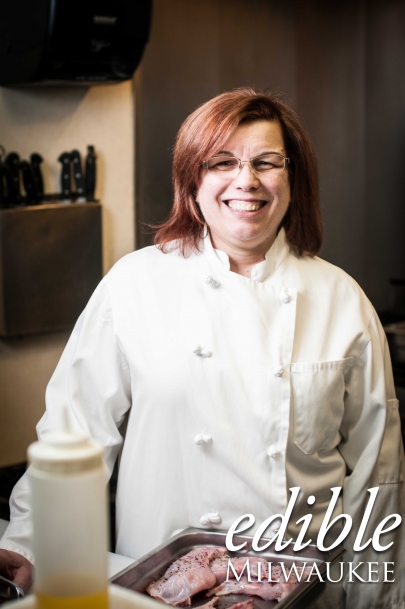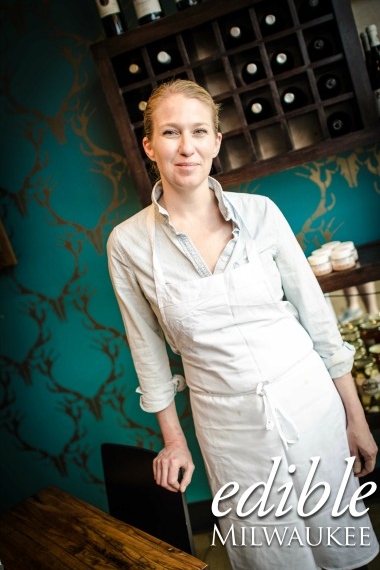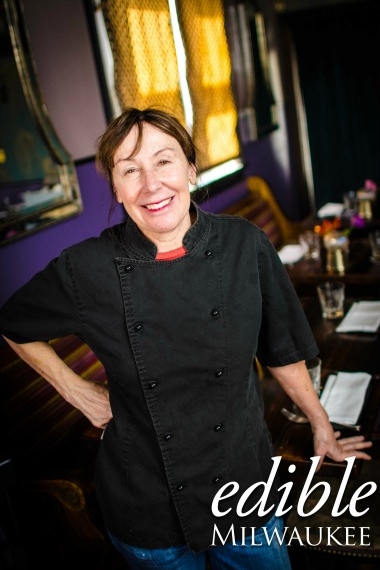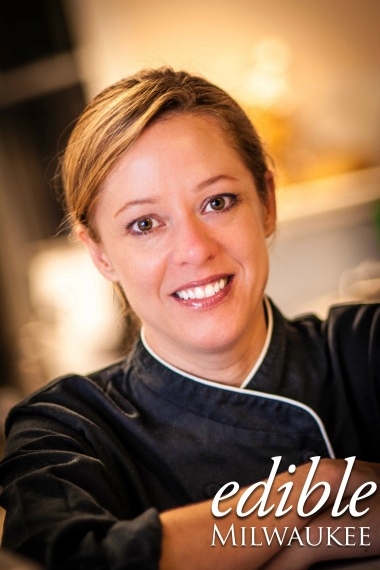Milwaukee’s Women Chefs Pave the Way
Commanding Kitchens, Overcoming Industry Challenges
No one would call Milwaukee’s female chefs pretentious. They aren’t seeking fame or showboating their successes. Instead, these women are approachable, humble and passionate about their craft.
These chefs are in the restaurant industry for the pure pleasure of cooking.
They adore being in the back of the house and aren’t afraid to face the challenges that deter many women from entering the field—physically grueling shifts in a hot, high-intensity environment, horrible hours and a culture deeply rooted in a boy’s club attitude.
Cooking is what drew these chefs to the kitchen and is what drives them to run some of the best restaurants in town. Unfortunately, there are only about a dozen women doing it.
Life on the Line
“It’s a hard industry,” says A.J. Dixon, chef and owner of Lazy Susan in Bay View. “TV has made [cooking] a very glorified field.”
The hours are long, the pay is low and the work is physical. In 2013, only 20 percent of chefs were female according to the U.S. Bureau of Labor and Statistics. Locally, Carol Deptolla, dining critic for The Milwaukee Journal Sentinel, recognized only four-and-a-half female-led kitchens in the “Top 30 Restaurants of 2015” (Goodkind in Bay View has two chefs — Paul Zerkel and Lisa Kirkpatrick).
Few restaurant kitchens are led by women.
“I didn’t think of myself as the only girl in the kitchen,” says Karen Bell, chef and owner of Bavette La Boucherie in the Third Ward. “It was just the way it was.”
“In a way, being the only woman molded me to be the kind of cook I am today.” Working with men taught Bell how to laugh off the little things, but also to be steadfast in stressful situations. “It probably was a challenge, but I guess I just didn’t try to think of it that way. I tried to think of it more as being one of the guys, hanging in there and showing them that I’m as capable or better
than them.”
Jan Kelly, executive chef and owner of Meritage in Washington Heights, grew up with parents who were chef owners of a restaurant in Southern California. When she decided to begin cooking in the late 70s, Kelly already understood the nature of the environment and the challenges it would present to her as a woman.
She knew she would likely be the only woman cooking and that the men wouldn’t make excuses for her gender, especially when it came to changing the often-crude culture found in kitchens.
“I made a conscious decision when I started working in kitchens and they were filled with men that I wasn’t going to be offended by things like language,” remembers Kelly. “I was lucky, though. No one ever talked down to me, no one ever made me feel stupid or that I couldn’t accomplish what I wanted. The only thing that ever stopped me from achieving anything was myself.”
Peggy Magister, chef and owner of Crazy Water in Walker’s Point, graduated from Marquette University with a nursing degree before deciding to enroll at The California Culinary Academy in San Francisco.
“My mom’s parents thought I was nuts,” says Magister. “Here I was with a nursing degree going to culinary school—what a waste!”
Nell Benton, chef and owner of The National in Walker’s Point, also began a traditional four-year degree before culinary school. “I thought that the culinary route wasn’t acceptable in my parent’s eyes as a suitable career.”
For a long time, chefs weren’t considered celebrities and cooks weren’t celebrated for their creativity and talents. Cooking wasn’t considered a professional career path. Today TV shows, movies and other media celebrate the artistry of cooking and showcase chefs,
making it a more acceptable career.
Bell dropped out of the University Wisconsin-Madison during her third year to enroll in Milwaukee Area Technical College’s (MATC) culinary program. “After the first day of culinary school I knew this was it. I knew that I wanted to cook.” Her family supported her decision, despite how uncommon it was for women. “It was hard for them to imagine me, as a woman, in a job like that.”
In some cases, resistance to women entering the culinary field is abrasive, demeaning and bordering upon assault.
“You can’t be a chef,” said a man to Dixon when she first decided to cook professionally. “You’re a girl—look at you.” Dixon, who is five-foot-nothing-but-fierce, took that to be a challenge. “You can’t tell me what I can’t do,” she says. “I’ll do everything to prove you wrong.”
Dixon is not the only one who had to show grit and determination when entering the industry. Women have to elbow their way in, proving that they’re capable of working just as hard as men and can handle the 500-degree ovens, sharp knives and close quarters of a
kitchen.
After graduating from MATC, Rosy Rodriguez was hired as a line cook, but was baffled when she was scheduled for only pastry shifts. When she approached the chef, he responded, “Girls look better baking.”
Addressing Stereotypes, Removing Stigmas
“Do they just stick women in baking because they don’t think they can handle the line?” wonders Magister. “It’s physical, but that never stopped me.”
More women lean towards the pastry or pantry stations in restaurants. A decade ago, 80 percent of bakers and 77 percent of pastry chefs were women according to a survey conducted by the online magazine, Starchefs.com. While pastry and pantry positions still pose challenges, it’s often believed that women excel in the less physical, more detail-orientated environments.
Endurance and brawn are not the end all, be all when it comes to the kitchen. Characteristics of women—being organized, meticulous and maternal—are beneficial as a chef.
“Women are important to a kitchen because they bring a different energy,” says Rodriguez. She believes women are effective problem-solvers and more in tune to the emotional needs of customers and staff.
“I think in general, men are brought up to be more competitive, more egocentric” says Kelly.
Benton agrees. “I believe women have an easier time collaborating and checking their egos at the door. We [women] do what needs to be done.”
“Lots of times we’re more detail-oriented in the kitchen. More thoughtful about things,” notes Dixon. “I constantly catch problems that my male cooks miss.” This is not to say that men are incapable of being organized, meticulous or maternal. Some men certainly are, but it’s less common. This becomes important in the chaotic atmosphere of a kitchen.
For a dinner service to run smoothly, there has to be a rhythm. The kitchen crew must be a cohesive unit tackling each table’s ticket with precision and impeccable timing. A bone-in rib-eye has to be ready at the same time as the seared scallops, as well as the Caesar salad with gluten-free croutons and dressing on the side.
Any hiccup can ruin the rhythm. A messy station, a broken sauce or a miscommunication can cause a kitchen to fall out of the swing service making unselfish, detail-oriented cooks assets on the line.
Even when women are being accepted for their culinary talents and ability to work in a kitchen, there’s still a stigma about the way in which they are praised.
“Here’s my job: I get to come in and make food, and I love it,” explains Kelly. For her, labeling chefs as female credits gender, not the talent of the individual. “I do understand as a woman that there are roadblocks to things, but I still wish that we just talked about people as chefs instead of making the qualification of whether they’re male or female.”
Echoing Kelly’s point, Bell says, “I would rather people call me a chef who happens to be female.”
Where Are the Women?
All of the line cooks at Lazy Susan, Company Brewing and Crazy Water are male. This is not because Dixon, Rodriguez and Magister don’t want to hire women, but rather because no women are applying.
“I just wish there were more females out there,” says Dixon. “I would like to see more women in management and chef roles. I would like to see more women in line cook positions.”
Dixon and most other chefs understand what drives women away from the industry—motherhood. Running a restaurant is an around-the-clock responsibility that makes motherhood an improbable option.
“This is not a job that’s conducive to regular hours. It’s not a 9 to 5. It’s not a day job—it’s a night job, it’s a holiday job, it’s a weekend job,” says Kelly. “I think it’s harder because for men, they’re just expected to go to work, but for women when we have children it’s always that question of who is going to stay and who is not.”
For those who do decide to have a family, juggling time between home and the restaurant requires a constant give and take. Men who are fathers certainly have similar struggles. No matter who you are, 60- or 70-hour workweeks are not conducive to a family life or children.
“In the beginning my family didn’t get it,” says Rodriguez. “They didn’t understand the industry or the hours. I remember my family calling me and saying, ‘What do you mean you’re not coming to Thanksgiving?’ Now, they get it.”
“You have to have a very understanding family,” says Dixon, a wife and mother of two. “And, at certain times, you yourself have to make sacrifices for them because they can’t always be sacrificing for you.” In order to spend more time with her family, Dixon often passes up opportunities to do collaborative dinners or special promotions. It’s a sacrifice she’s willing to make.
Other factors of cooking life, like poor health care and short maternity leaves, make the decision to start a family more difficult for women. A 2014 report by Cornell and Ohio State Universities found that about 50 percent of fine dining establishments in the nation offer paid vacation or employer subsidized health insurance. Casual restaurants are even less likely to provide benefits.
“We’re losing a lot of women,” said Rodriguez. Even with health insurance, being pregnant while working in a hot, stressful kitchen is strenuous. It’s common for women to choose being a chef over a mother.
“There’s no way I could have a family,” says Benton. “I feel guilty about the lack of time I spend with my dog.”
“Having a family? Forget about it,” says Magister. “I don’t even know how the guys do it.”
Slowly, the restaurant industry is shifting. Compared to even a decade ago, more women are running restaurants both nationally and in Milwaukee. Gender equality is still a long ways away, and for that to happen women cannot be the only ones calling out for change. Men must also make these issues a priority.
And yet, despite the challenges, chefs in Milwaukee are optimistic about the future of cooking and encourage other women to enter the industry.
Bell gives men and women the same advice. “You have to love it. There’s so much more that goes into it. There are so many pressures put on you, just physical alone.”
“I always forewarn them a little bit, but at the same time encourage them if that’s where their passion lies. It’s rewarding and exciting, but there are certain personalities that thrive in it and those that don’t.”
Benton provides similar words of encouragement to young cooks. “I always tell people, do it if you can’t imagine yourself doing anything else in life. Don’t do it for the money, for the fame, for the hours. If you’re passionate, go for it.”









